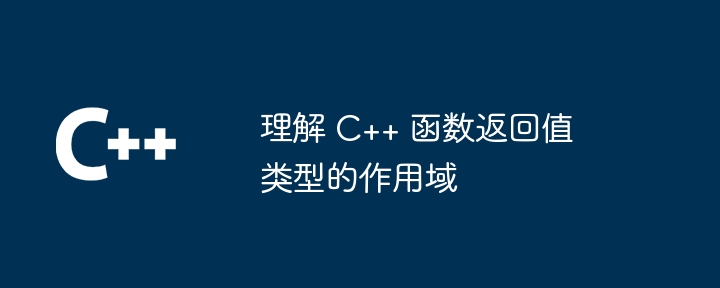Home >Backend Development >C++ >Understanding the scope of C++ function return types
Understanding the scope of C++ function return types
- WBOYWBOYWBOYWBOYWBOYWBOYWBOYWBOYWBOYWBOYWBOYWBOYWBOriginal
- 2024-04-13 16:03:02634browse
C The scope of the function return value type is limited to the function body. It is used to specify the data type of the value returned by the function, which helps ensure type safety and correct use of the returned value.

Understand the scope of C function return value type
In C, the return value type of a function specifies the function after it is called The data type of the returned value. The return type is important for understanding the purpose of a function and how to use its return value.
The scope of the return value type
The scope of the return value type of a function is limited to the function body. This means that the return value type is not directly accessible from outside the function. This helps ensure type safety and prevents accidental overwriting of the return value type.
Practical case
Consider the following function that calculates the sum of two numbers:
int sum(int a, int b) {
// 计算 a 和 b 的和
int result = a + b;
// 返回和
return result;
}In this function, the return value type is int, which means the function returns an integer. In the function body, the result variable stores the result of the summation and returns it to the caller.
Using the return value externally
The return value of a function is used outside the function by calling the function and capturing its return value. For example:
int main() {
// 调用 sum 函数并存储返回值在 sum_result 变量中
int sum_result = sum(10, 20);
// 使用 sum_result 变量
cout << "和为:" << sum_result << endl;
return 0;
}In the main function, we call the sum function and capture the return value. This allows us to use that return value and print it to the console.
Conclusion
Understanding the scope of a C function return value type is critical to ensuring type safety and correct use of the returned value. By limiting the return value type within the function body, it helps prevent accidental overrides and errors.
The above is the detailed content of Understanding the scope of C++ function return types. For more information, please follow other related articles on the PHP Chinese website!
Related articles
See more- Detailed explanation of scope + closure in Javascript
- Introduction to standardization of api return values (code example)
- What are the differences between c++ and python?
- What are static variables? What are its characteristics? Where is the scope? (with examples)
- Can Microsoft Visual C++ be uninstalled?

